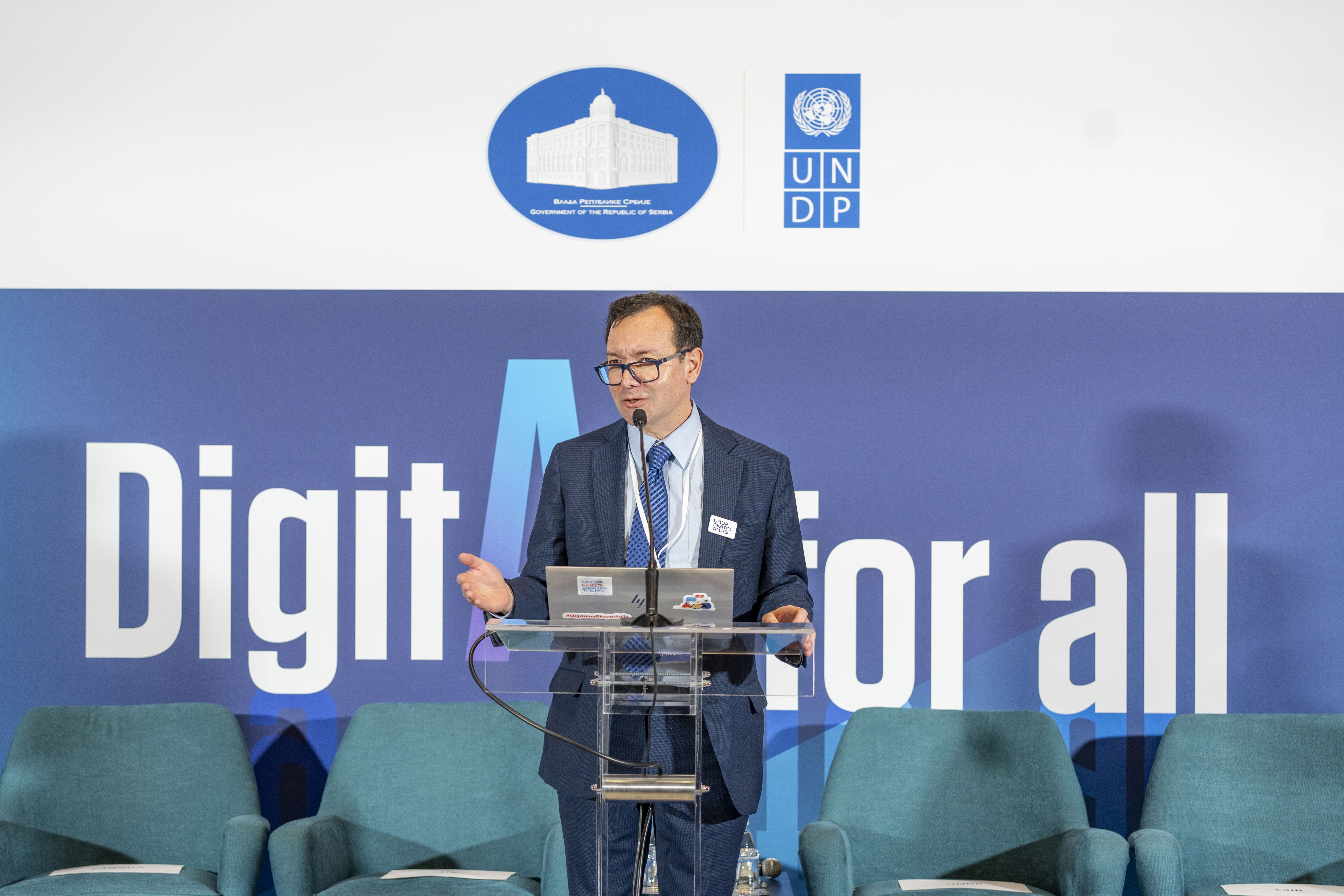
Belgrade, 5 December, 2024 – The “DigitAl for All” panel organised by the United Nations Development Programme (UNDP) in Serbia took place yesterday at the Global Partnership on Artificial Intelligence (GPAI) Summit. High-level diplomatic corps of France, Canada and the United Kingdom, the Director of the Centre for the Fourth Industrial Revolution (C4IR) and UNDP Resident Representative in Serbia, discussed how digital tools, such as artificial intelligence (AI) can contribute to sustainable development and how international cooperation can address the risks arising from the rapid advancement of new technologies, particularly in terms of deepening existing inequalities and reinforcing stereotypes.
In his keynote speech to the panel, Heriberto Tapia, Head of Research at UNDP Human Development Report Office emphasised the importance of changing our approach to AI – from the idea of AI replacing humans to the idea of AI complementing human knowledge and skills.
“Artificial intelligence and digital technologies have a significant social and cultural impact on all stages of life. They affect everything from the physical development of children and early brain development to the skills and mental health of students and even adults, where new technologies affect all aspects of life - social, political and economic - from increased stress levels and faster spread of misinformation to the displacement of jobs due to automation”, Tapia noted.

Heriberto Tapia, Head of Research at UNDP Human Development Report Office
“Ensuring AI is used effectively and ethically, leaving no one behind, is the responsibility of all states and other stakeholders. Only by working together, through forums such as GPAI, can we achieve this globally,” stated H.E. Michelle Cameron, Ambassador of Canada to Serbia.
H.E. Pierre Cochard, Ambassador of France to Serbia, stressed that France shares the same approach to innovation and AI as Serbia, which is a positive sign for future cooperation.
“We both aim for an inclusive, ethical and sustainable AI. For this reason, we can explore other opportunities to work together, not only on AI application, but also on its regulation,” said H.E. Cochard. He added that since French President Macron’s visit to Serbia last August, innovation and AI have become key areas of cooperation. “This cooperation was significantly enhanced through the signing of several bilateral agreements since 2023,” the French ambassador highlighted.
Dominic Otway, Deputy Ambassador to the British Embassy, talked about the priorities of his country, which is at the forefront of global AI regulation and governance efforts.
“AI knows no borders. Its impact will shape societies and economies around the world, and the only way we can effectively govern this technology is through international cooperation we promote through GPAI. I am pleased that UNDP is emphasising the importance of inclusion and equality – we need AI to work for everyone, not just some, under the same conditions and without bias. The UK is working together with its partners to maximise the benefits and mitigate the risks,” explained the Deputy Ambassador.
Jelena Bojović, Director of the Centre for the Fourth Industrial Revolution in Serbia (C4IR), mentioned that the institution cooperates with the Office for IT and eGovernment to support biotech institutes and companies by providing them with access to key infrastructure such as the supercomputer at the Government Data Centre.
“We also provide pharmaceutical companies and institutes with human and technological resources to carry out pilot projects in research and development, paving the way for future innovations in healthcare and biotechnology,” said Bojović. She added that C4IR, in cooperation with the Ministry of Science and the Ministry of Education, has launched a master's programme in bioinformatics, which will welcome its first students next October.
Following this panel discussion, the UNDP Istanbul Regional Hub Innovation Team organised an interactive session on the use of artificial intelligence for government employees. The aim of this session was to design AI training programs tailored for various profiles of government employees, so that they can perform their daily tasks more efficiently according to their specific needs and responsibilities, such as public accountability and transparency.
“Only 3 out of 10 civil servants feel confident in using AI tools. This is the gap we need to bridge. Understanding the role of AI goes beyond technical knowledge and requires building new skills for civil servants at all levels, from policymakers to frontline service providers. Only with new knowledge can they use modern technologies effectively and responsibly to improve public sector performance and deliver better public services for all, benefiting society as a whole,” said Yakup Beris, UNDP Serbia Resident Representative.

***
Over 130 delegates and 1,000 experts from around the world took part in the Global Partnership on Artificial Intelligence (GPAI) Summit, which was organised by the Government of Serbia with the support of the OECD and UNDP. They discussed global challenges and solutions related to AI, fostering international cooperation and the creation of ecosystems that support ethical, inclusive and sustainable innovation. The GPAI is a leading international organisation dedicated to the development, application and regulation of artificial intelligence.

 Locations
Locations


